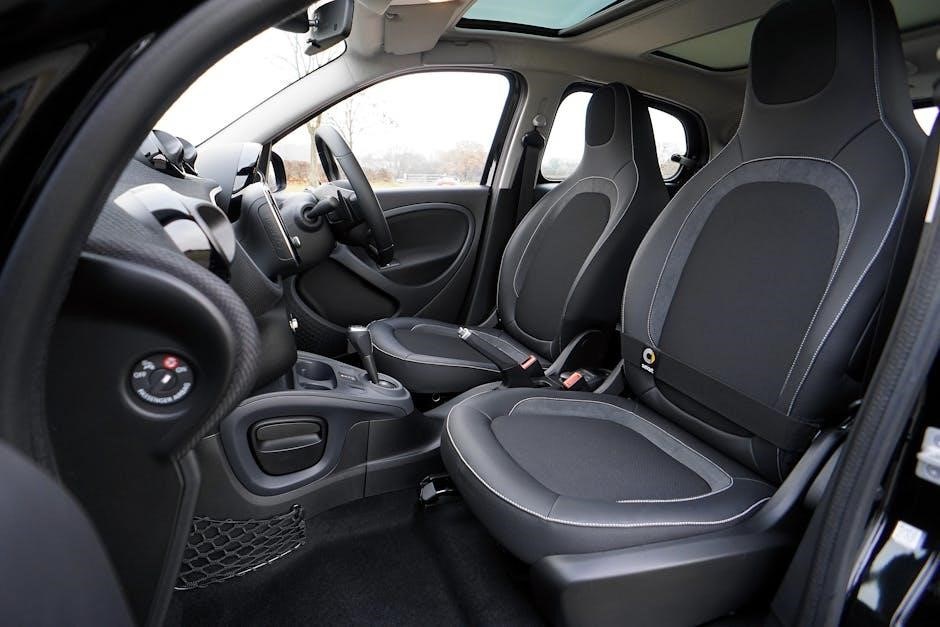
new hampshire driver’s manual
Overview of the New Hampshire Driver’s Manual
The New Hampshire Driver’s Manual is a comprehensive guide for residents seeking to obtain or renew a driver’s license. It details traffic laws, safe driving practices, and licensing procedures, ensuring drivers are well-informed and prepared for the road.
1.1 Importance of the Manual for New Hampshire Residents
The New Hampshire Driver’s Manual is essential for residents, providing critical information on traffic laws, safe driving practices, and licensing requirements. It ensures drivers understand their responsibilities, preparing them for tests and promoting road safety. This guide is vital for first-time drivers and experienced motorists alike, fostering responsible driving habits statewide.
1.2 Key Topics Covered in the Manual
The New Hampshire Driver’s Manual covers essential topics such as traffic laws, road signs, safe driving practices, and licensing procedures. It also includes information on road safety tips, driver responsibilities, and rules of the road, serving as a comprehensive study guide for new and experienced drivers alike.

Eligibility Requirements for a New Hampshire Driver’s License
To apply for a New Hampshire driver’s license, residents must meet age requirements, provide proof of residency, and pass vision and medical tests. Additional documentation may be required for non-U.S. citizens.
2.1 Age Requirements for Different License Types
In New Hampshire, the minimum age for a Youth Operator License is 15 years, while a Full Driver License is issued at 18. Intermediate licenses are available at 16 with certain restrictions, ensuring gradual driving privileges aligned with driver maturity and experience.
2.2 Residency Requirements and Documentation
New Hampshire requires residents to obtain a state driver’s license within 60 days of establishing residency. Applicants must provide proof of identity, residency, and Social Security number. Accepted documents include birth certificates, utility bills, and valid passports. Contact the Concord DMV at 603-271-2251 for specific requirements.
2.3 Vision and Medical Requirements
Applicants must pass a vision test meeting New Hampshire’s standards, which may include visual acuity and field of vision assessments. Certain medical conditions may require a doctor’s note or further evaluation. Non-US applicants must also complete vision, knowledge, and road tests as part of the licensing process.

Types of Driver’s Licenses in New Hampshire
New Hampshire offers passenger vehicle licenses, commercial driver’s licenses (CDL), and restricted licenses. Each type serves specific driving needs, ensuring residents can operate vehicles safely and legally.
3.1 Passenger Vehicle Licenses
A passenger vehicle license allows drivers to operate standard cars, trucks, and SUVs for personal use. Eligibility includes meeting age, residency, and testing requirements. It is valid for a set period and must be renewed to maintain driving privileges in New Hampshire.
3.2 Commercial Driver’s Licenses (CDL)
A Commercial Driver’s License (CDL) is required for operating heavy vehicles, buses, or hazardous material transport. Eligibility includes a medical certificate, residency proof, and passing Class A, B, or C tests. The manual outlines application steps, testing requirements, and renewal processes for CDL holders in New Hampshire.
3.4 Restricted Licenses and Permits
Restricted licenses and permits in New Hampshire are designed for young or inexperienced drivers. These include learner’s permits and provisional licenses, which gradually grant driving privileges. The manual details eligibility, restrictions, and requirements for upgrading to a full license, ensuring a safe transition to independent driving.

Application Process for a New Hampshire Driver’s License
The application process involves submitting required documents, passing vision and knowledge tests, and completing a road test. The manual outlines step-by-step procedures for first-time applicants and license renewal.
4.1 Steps to Apply for a First-Time License
First-time applicants must prove residency, pass a vision test, and complete knowledge and road tests. The manual guides residents through these steps, ensuring compliance with state requirements for obtaining a valid driver’s license.
4.2 Required Documents for Application
Applicants must provide proof of identity, residency, and legal presence. Documents include a valid passport, birth certificate, Social Security card, and New Hampshire residency proof, such as a utility bill or lease agreement, to complete the licensing process successfully.
4.3 Fees and Payment Methods
The New Hampshire DMV charges specific fees for driver’s licenses, varying by type. These fees cover application and testing processes. Accepted payment methods include cash, credit cards, and personal checks. Financial assistance is available through the New Hampshire Driver Education Fund for eligible young drivers.

Driver’s Education and Training in New Hampshire
Driver’s education in New Hampshire includes state-approved courses and behind-the-wheel training. These programs teach safe driving practices and road safety. Financial assistance is available through the New Hampshire Driver Education Fund, helping young drivers afford necessary training and licensing fees.
5.1 State-Approved Driver Education Courses
New Hampshire offers state-approved driver education courses designed for new drivers. These programs cover traffic laws, road safety, and driving techniques. They are available for teens and young adults, with financial assistance and scholarships provided through the New Hampshire Driver Education Fund to help offset costs and ensure accessibility.
5.2 Behind-the-Wheel Training Requirements
Behind-the-wheel training in New Hampshire requires supervised practice and professional instruction. The state mandates a minimum number of hours to ensure new drivers master safe driving techniques and road readiness. Financial assistance is available through the New Hampshire Driver Education Fund to support young drivers in completing these requirements.
5.3 Financial Assistance for Young Drivers
New Hampshire offers financial assistance to young drivers through the New Hampshire Driver Education Fund. This program provides scholarships and partial funding for driver education courses, helping young adults achieve licensure and improve road safety. Eligible students can apply to reduce the cost of mandatory training programs.
Tests Required for Obtaining a License
To obtain a New Hampshire driver’s license, applicants must pass a vision test, written knowledge test, and road test, ensuring they meet the state’s driving requirements and safety standards.
6.1 Vision Test Requirements
The vision test assesses visual acuity to ensure safe driving. Applicants must meet specific acuity standards, typically 20/40 in both eyes, with or without corrective lenses. Those with vision impairments may need medical clearance or restricted licenses.
6.2 Written Knowledge Test
The written knowledge test evaluates understanding of traffic laws, road signs, and safe driving practices. Applicants must score at least 80% to pass. The test is mandatory for first-time license applicants and non-US residents, unless transferring an out-of-state license.
- Covers rules of the road and sign recognition.
- Study the New Hampshire Driver’s Manual for preparation.
6.3 Road Test Procedures and Scoring
The road test assesses vehicle control, parking, and turning skills. Applicants must demonstrate safe driving habits and adherence to traffic laws. Scoring is based on precision and safety, with a passing score of 75%. Errors like failure to yield or speeding result in points deducted, and critical errors cause automatic failure.
- Includes parallel parking and three-point turns.
- Must use a properly insured and registered vehicle.

Driver’s License Restrictions and Penalties
Driver’s licenses in New Hampshire may have restrictions based on age or driving violations. Penalties for traffic offenses include points on your record, fines, and license suspension. Severe violations can lead to revocation, requiring completion of driver improvement courses or reapplication processes.
7.1 Restrictions for Teen and Young Adult Drivers
Teen drivers in New Hampshire face specific restrictions, including limits on the number of passengers under 21 and a nighttime driving curfew from midnight to 4 AM. Young drivers under 18 must complete a driver education course and hold a learner’s permit for at least 40 hours of practice. These rules aim to promote safe driving habits and reduce risks.
7.2 Consequences of Traffic Violations
Traffic violations in New Hampshire can result in license suspension, fines, and points on your driving record. Accumulating excessive points may lead to mandatory driver improvement courses or license revocation. Repeat offenses can increase penalties, while serious violations may incur court appearances and higher insurance rates.
7.3 License Suspension and Revocation Criteria
New Hampshire may suspend or revoke a driver’s license for accumulating excessive points, DUI convictions, or reckless driving. Suspension periods vary based on the severity of the offense, while revocation is typically for more serious violations. License reinstatement requires completing mandatory requirements and paying reinstatement fees.

Renewal and Replacement of a Driver’s License
Renewal ensures continued driving privileges, with deadlines and methods outlined. Replacement for lost or stolen licenses is available through DMV offices, requiring proper documentation and fees.
8.1 Renewal Process and Deadlines
New Hampshire driver’s licenses must be renewed periodically, with deadlines varying based on license type. Residents can renew online, by mail, or in-person at a DMV office. Proper documentation, such as proof of identity and residency, is required. The Concord DMV office can be reached at 603-271-2251 for assistance. Online scheduling is available.
8.2 Replacement Process for Lost or Stolen Licenses
If your New Hampshire driver’s license is lost or stolen, you must report it promptly. Visit a DMV office with proper identification and complete a replacement application. A fee will apply, and expedited processing may be available. Contact the Concord DMV at 603-271-2251 for guidance on the replacement procedure.
8.3 Updating License Information
New Hampshire residents must update their driver’s license information within 30 days of any changes. Visit a DMV office with required documents, such as proof of residency or name change. Contact the Concord DMV at 603-271-2251 for specific requirements and to ensure compliance with state regulations.

New Hampshire DMV Locations and Services
The New Hampshire DMV operates multiple locations, with the main office in Concord. Services include driver’s license issuance, vehicle registration, and renewal processes. Visit the DMV for all motor vehicle-related needs, ensuring compliance with state regulations and requirements.
9.1 Concord DMV Office Contact Information
The Concord DMV Office is located at 23 Hazen Drive, Concord, NH. For inquiries, call 603-271-2251. This office provides essential services, including driver’s license issuance, vehicle registration, and more. Visit for assistance with motor vehicle-related tasks and ensure compliance with state requirements.
9.2 Services Offered at DMV Locations
New Hampshire DMV locations provide essential services, including driver’s license issuance, vehicle registration, title services, and ID cards. Residents can also schedule appointments for road tests and other licensing procedures. These offices ensure efficient processing of motor vehicle-related tasks, helping residents maintain compliance with state driving laws and regulations.
9.3 Scheduling Appointments Online
New Hampshire DMV offers an online appointment scheduling system, allowing residents to book visits for driver’s license applications, road tests, and other services. This convenient option streamlines the process, reducing wait times and ensuring efficient service. Visit the official NH DMV website to schedule your appointment and view available time slots.

Fees and Financial Assistance
The New Hampshire DMV outlines fees for driver’s licenses, renewals, and related services. Financial assistance, such as scholarships, is available for young drivers through state-funded programs.
10.1 Cost of Obtaining and Renewing a License
The cost of obtaining and renewing a driver’s license in New Hampshire varies by age and license type. Initial licenses and renewals involve specific fees, which can be paid at DMV locations. The Concord DMV office, reachable at 603-271-2251, provides detailed fee structures for residents.
10.2 Financial Aid for Driver Education
Financial aid for driver education in New Hampshire is available through the New Hampshire Driver Education Fund, offering scholarships to young drivers needing assistance. These funds help cover the costs of state-approved driver education courses and behind-the-wheel training. Eligible students can apply through designated programs.
10.3 Scholarship Opportunities for Students
New Hampshire offers scholarship opportunities for students pursuing driver education. The New Hampshire Driver Education Fund provides financial assistance to eligible students, helping them cover the costs of driver training. These scholarships aim to make driver education accessible to all, regardless of financial background.

Road Safety and Driver Responsibility
New Hampshire emphasizes road safety through education and awareness programs. The state’s initiatives, including the New Hampshire Teen Driver program, focus on reducing accidents by promoting responsible driving behaviors and adherence to traffic laws.
11.1 New Hampshire’s Road Safety Initiatives
New Hampshire has implemented various road safety initiatives to reduce accidents and promote responsible driving. These include the New Hampshire Teen Driver program, which focuses on preventing injuries and fatalities among young drivers through education and outreach efforts.
11.2 Driver’s Role in Preventing Accidents
Drivers play a critical role in preventing accidents by adhering to traffic laws and practicing safe driving habits. Vigilance, defensive driving, and avoiding distractions are essential. Educational programs, such as the New Hampshire Teen Driver initiative, emphasize these principles to promote road safety and reduce collisions.
11.3 Legal and Ethical Responsibilities of Drivers
Drivers in New Hampshire must obey traffic laws, report accidents, and ensure vehicle safety. Ethically, drivers should promote road safety, respect others, and avoid reckless behavior. The DMV emphasizes license authenticity and warns against fraudulent activities, ensuring compliance with legal and ethical driving standards statewide.